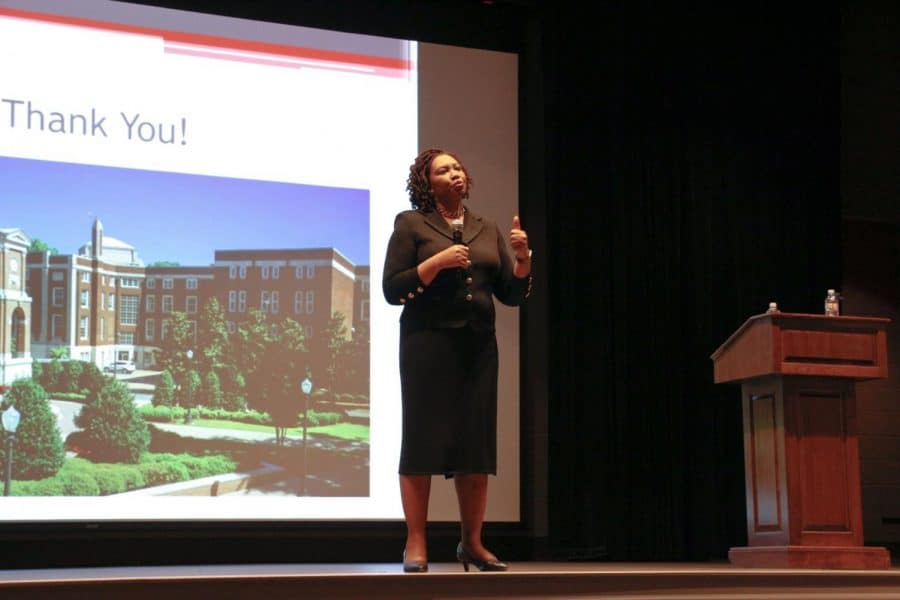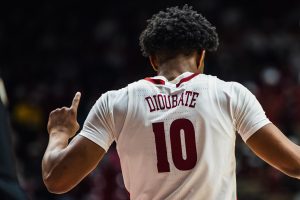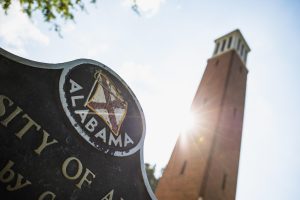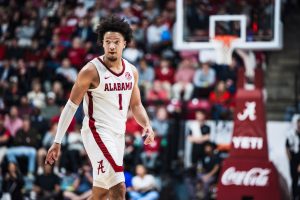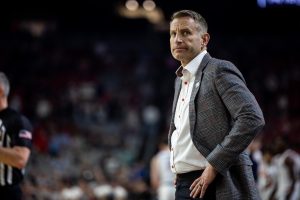CANDIDATE RECAP: Younger says she’s not afraid to challenge the status quo
January 18, 2020
As Toyia Younger stepped onto the stage of the Ferguson Theatre on Friday morning, she warned the audience that she wasn’t the type to stand still.
“I’m going to have to watch myself because I’m a walker,” Younger said. “I’m the daughter of a pastor, so I might take this microphone with me and you won’t know what’s going to happen. And at the end I will be collecting an offering.”
Younger is the third of five candidates to present in an open forum for the vice president of student life, a position that opened after David Grady’s resignation in July. An 11-member committee, announced in late September, narrowed down the search to five candidates, who will each present at the Ferguson Center Theatre over the next two weeks.
With nearly two decades of experience in higher education, her research focuses on support for public higher education, transfer students, college readiness and underserved student populations.
Following her graduation from Michigan State University with a bachelor’s degree in social relations, Younger said she lacked a sense of direction but saw potential in Washington D.C. It was this decision to relocate that led her to work as a legislative assistant to Rep. Bruce F. Vento, who served on the education subcommittee. This experience exposed her to the realm of educational policy. Vento encouraged her to return to school for her master’s degree, which she did at Trinity Washington University.
Her first job following the completion of her master’s program was as director of student life at Montgomery College, a community college that made her attuned to the experience of transfer students. This interest inspired her dissertation, “The Case for Degree Completion: African American Transfer Students at a Traditionally White Institution.”
To maintain a steady income while completing her dissertation research, she found herself working as the director of student affairs at the Association of Public Land-Grant Universities (APLU), which oversees policies and programs at Research I member institutions. Younger said her work with APLU provided her with the unique experience of observing national trends in higher education.
Younger took on the role of associate provost at Towson University following her realization that she needed to be more closely involved with a campus community. The transfer student population rose from 25% of the student population to 55%. This change in the composition of the student body drew her attention to the transitions and experiences of students.
“We have to be aware of the policies that impact students and the barriers that we may or may not be aware of that impact students,” Younger said.
Raised in Flint, Michigan, Younger said her environment was not centered on the pursuit of a college education. When her mother graduated in 1968, working at General Motors in nearby Detroit was expected. Younger’s mother defied this expectation with the encouragement of a principal and was the first in her family to attend college. She credits this decision for the value she saw in pursuing higher education.
Younger’s career path has exposed her to the realm of both academic affairs and student affairs, and she said she credits this for her understanding of the interaction and collaboration between the two.
She took time to outline her definition of student success, which involves preparation for post-graduate pursuits and the development of what she called a “whole student.” This kind of success prepares students to be productive citizens who excel in their careers.
“Authentic, a servant leader, a team player, accessible and flexible.” These are the words Younger used to describe herself as a leader and the values she assured the audience she would bring to the position.
The “tremendous amount of growth in a short period of time” at the University and the “opportunity to build on the momentum taking place” caught her attention, along with the distinctive career and co-curricular activities outlined in the University’s strategic plan. She said she values this type of commitment to students beyond academics.
Younger said the teacher in her couldn’t resist giving a short history lesson on the evolving role of student life in higher education. The role was originally designed with the term “in loco parentis” in mind, meaning “in the place of a parent.” This reflected the mindset of “we’re here to make sure you don’t get in trouble,” according to Younger. The role has evolved to encompass the lives of students beyond academics.
Younger highlighted free speech, mental health and guns on campus as the most pressing policies impacting students and student safety, particularly at a large flagship university; she noted admissions scandals, challenges faced by DACA recipients and reliance on financial aid as reflections of the pressure students feel to perform at the highest level.
“Are we bold enough to make systemic change?” she asked the audience.
An entire slide of her presentation was devoted to this question. Younger said she believes it is the job of administrators to be bold enough to take risks that will create an environment fit for all students. An unwavering commitment to hearing student voices resurfaced throughout the presentation.
She recalled the experience of organizing commencement at Towson University and the sense of accomplishment she felt watching students walk across the stage.
“It was something about seeing those students who I’d been working with for three, four, seven years on campus finally cross that stage,” Younger said. “It gave me a sense of accomplishment, a sense of, ‘This is why I do what I do.’ When you move outside of that realm, you miss it. That’s what’s really drawing me back.”
If selected for the position, Younger said her first steps will be to meet with the leadership of different offices, form relationships with staff and students and attend club and organizational meetings and campus events. She voiced a commitment to avoid the trend of people moving higher up in education and moving further away from students.
PUBLIC COMMENTS
After opening the floor up for questions from the audience, an audience member asked what things she would like to implement at UA. Younger said she wants to first hear the thoughts of people who are more familiar with the institution to understand the most pressing issues facing the campus community.
Farrah Sanders, a senior majoring in news media, asked how she will attend to the issue of shifting the culture to make the University less reactionary and foster a progressive community. Younger said she has always operated with an open-door policy and is able to hear unpleasant things before they are in that situation.
Another student asked if this would be Younger’s first position in education in the South and if she is willing to enact positive change, even if it causes disruption in the current system. Younger assured the audience that she is unafraid to stand up and “say things people don’t always want to hear,” and she said she believes she would be doing a disservice to not stand up for the things she believes in.
“I think it’s important to have someone who’s willing to challenge the status quo,” Younger said. “I’m OK with being uncomfortable.”
You can view a livestream of the talk here, and Younger’s CV can be found here. Additional feedback can be directed at LeNá McDonald at lena.mcdonald@ua.edu. The next candidate will present at the Ferguson Center Theatre on Wednesday, Jan. 22 from 11 a.m. to 12:30 p.m.
Stay tuned for continued coverage of this search process.
Editor’s Note, Jan. 19: A previous version of this story stated that the evaluation form will close on Tuesday, according to a note on ua.edu/vpsl that the forms would close the next business day. As of Sunday, Younger’s information was removed from the site, so this story has been updated to include a link to Younger’s CV and an email address to provide feedback to.



